Monty Python Star John Cleese To Make Formal Complaint Regarding The “Dishonesty, Deception, And Tone” Of Recent Interview With BBC World News
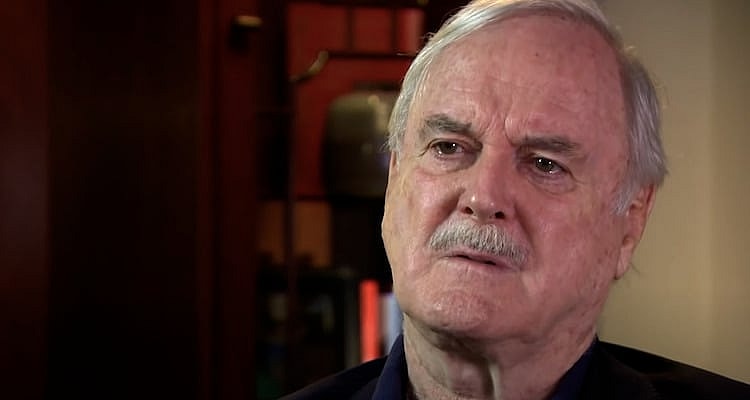
Comedy legend John Cleese, best known for his many roles in Monty Python’s Flying Circus, will be making a formal complaint about the “deception, dishonesty and tone” of a recent interview he did with BBC World News’ Karishma Vaswani.
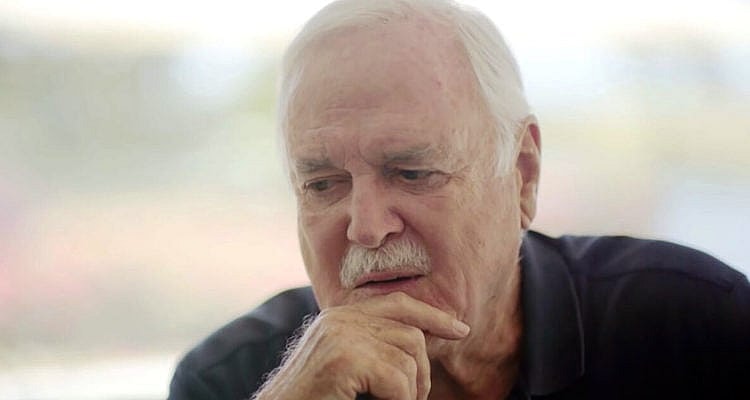
Cleese is currently working on an upcoming documentary series that is set to explore the effects of cancel culture on comedy. With this project in mind, BBC World News reporter Karishma Vaswani asked the comedian what exactly is it that interests him about the particularly shameful practice.
“Well, it’s a relatively new phenomenon, and of course it affects comedians because a lot of us do jokes that the cancel culture people…woke people don’t think are right, or don’t think are correct, ” Cleese asserted. “So, I’ve been asked to do the program, and so I’ve been exploring and I’ve been reading quite a lot of books, and trying to understand what it’s all about. But it’s quite a complex matter, and it seems to be boiling down to the fact that…I think some people are rather overprotective.”
“I mean, we all want parents to be protective, but we don’t want them to be overprotective because that raises children who are no, perhaps, very well going to adapt to the real world,” the Monty Python star elaborated.
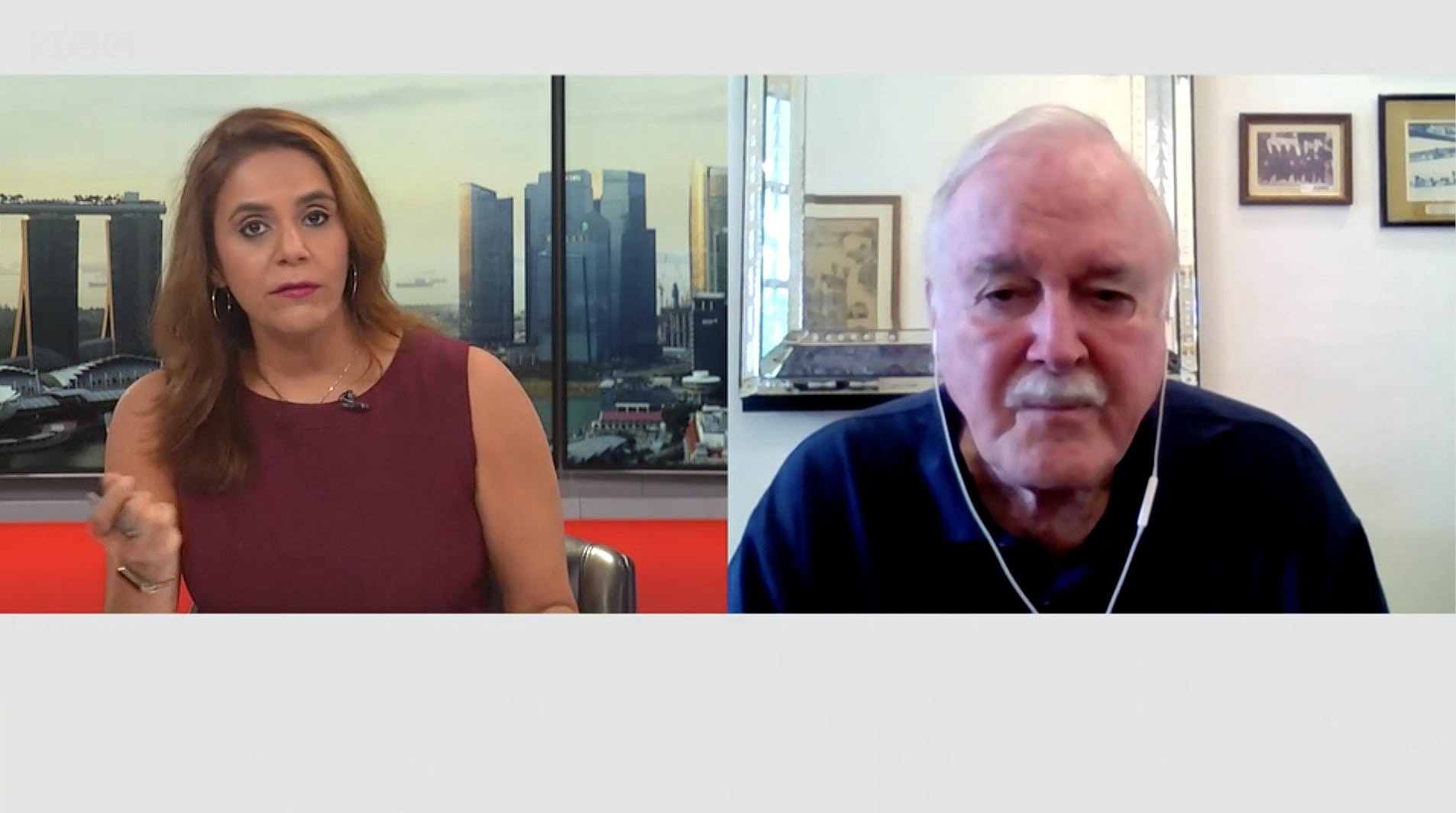
The comedian further explained, “I think it’s very important that things should go wrong and that minor bad things should happen, because that helps people to learn to become a little bit tougher when they go out into the world, which is not a terribly friendly place a lot of the time,” before concluding, “And if we overprotect them, then I think that doesn’t work very well.”
It was at this point that the BBC reporter attempted to counter Cleese’s clearly-educated opinion on the phenomenon.
“But John, you know, some would say that what you’re suggesting is that it’s an,” uttered Vaswani before Cleese interrupted her asking, “Why do you say ‘but’? Wouldn’t you like to just explore what I’m saying here?”
Vaswani then proceeded to lecture the comedian, stating that his views on cancel culture may be “old-fashioned” and suggesting that Cleese is not “taking into consideration the feelings of people who have been hurt” by comments the reporter deemed hurtful.
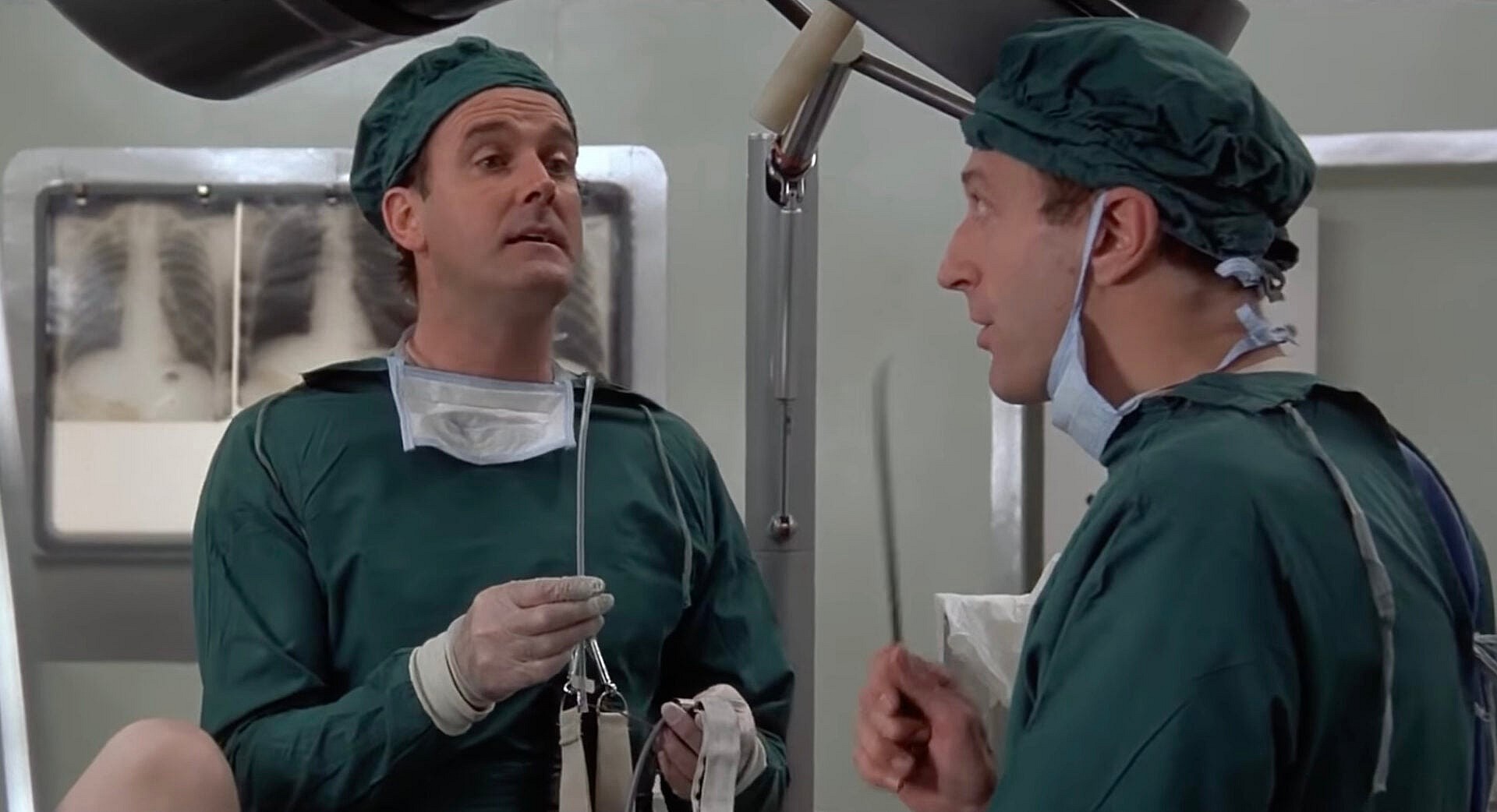
“For instance, in Britain, where racist behaviour was couched as a bit of banter…is that acceptable in your view as a joke?” the reporter asked the Fawlty Towers star, to which he replied, “I think it’s a very poor question.”
Further pressed by the reporter to answer her question, Cleese then asserted, “Well, it’s hard because it’s so scattered, and it has so many different ideas in it, and I don’t know which place to start with to answer it.”

“What I’ve said is, the important thing is that people are protected to the right degree, not only overprotected or not under-protected,” he declared. “So the question becomes, ‘what is the right degree?’ Now, practitioners of cognitive behavioural therapy — which is a very successful therapy, which is used a lot to treat depression and anxiety in young people — say that the woke ideas are pretty much the opposite of what they use to make people less depressed.”
“Now, it doesn’t matter whether that’s old-fashioned or new-fashioned or even from the early 12th century,” he added. “That is a very interesting idea, and needs to be explored without using these emotional terms like ‘people being hurt’ and all these kinds of things.”
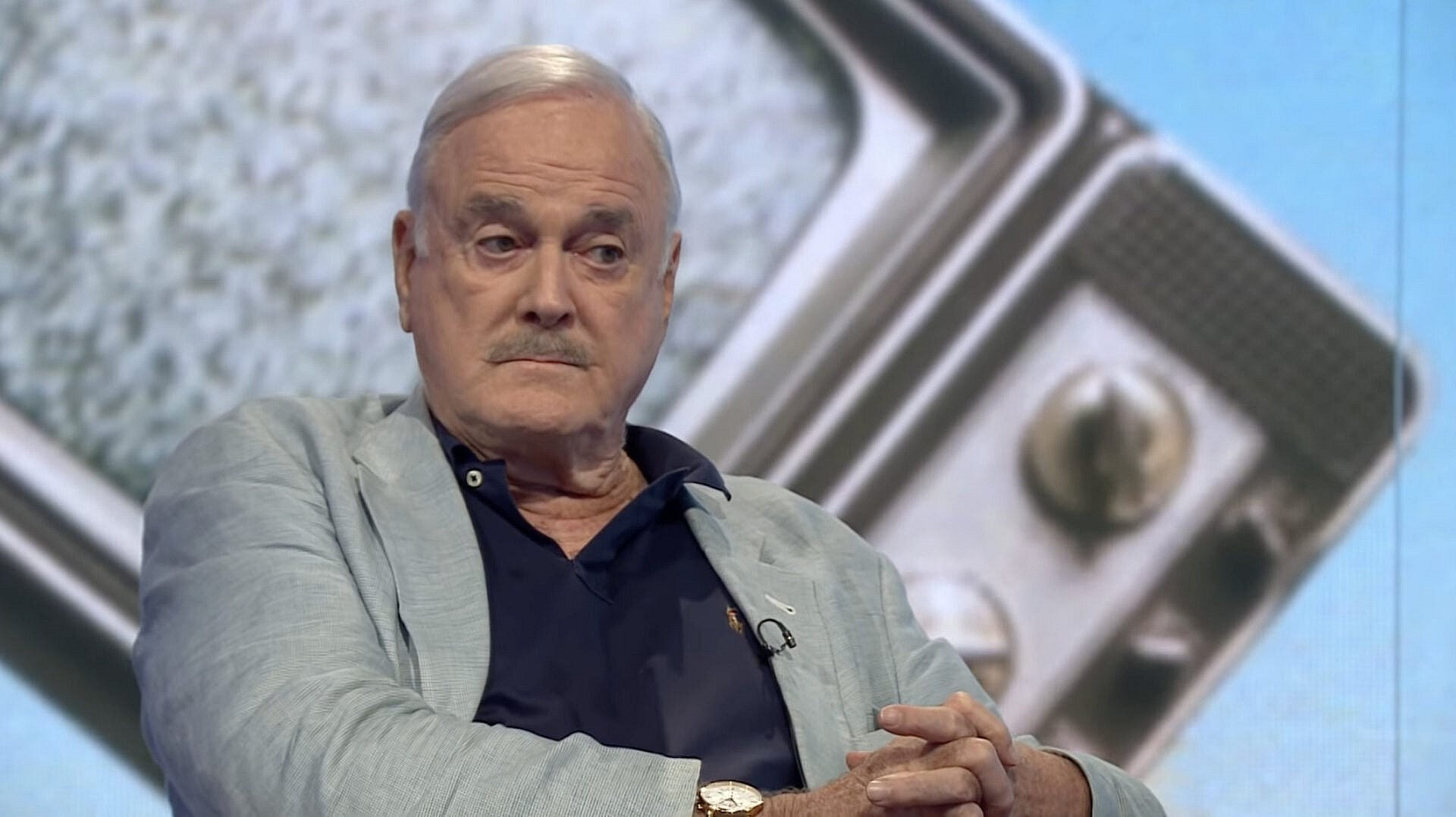
RELATED: Director David Zucker Says Airplane! Could Only Be Made Today “Without The Jokes”
As the interview went on, the BBC World News reporter returned to the topic of cancel culture once again, this time asking Cleese to give his thoughts on the controversy surrounding fellow comedian Dave Chappelle – a line of questioning which did not sit well with the Monty Python star.
“John I want to ask you about your thoughts on another comedian. I don’t know if you know this American comedian Dave Chappelle, who faced a huge backlash…” Vaswani asked Cleese before he abruptly interrupted her.
“We’re back on cancel culture here,” the actor retorted. “I thought we were going to be talking about shows and comedy but I’m not interested in doing this interview anymore, so I’ll leave you now. Bye-bye.”
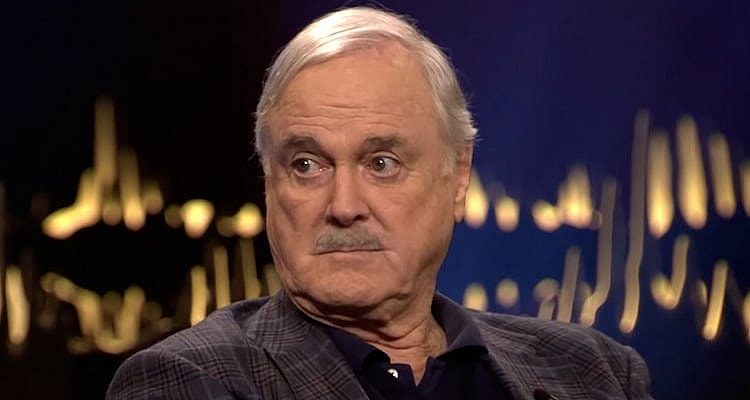
In the wake of the incident detailed above, Cleese took to social media to explain the situation before the mainstream media misinterpreted what really prompted him to walk out of the interview.
“I just did an interview BBC World Asia,” wrote Cleese at the start of a lengthy thread on Twitter. “It was to talk about the shows I’m doing in Singapore and Bangkok. Instead, the interviewer, whose name was, I think, Karishma, started by asking me questions about Cancel Culture. I replied courteously and in full.”
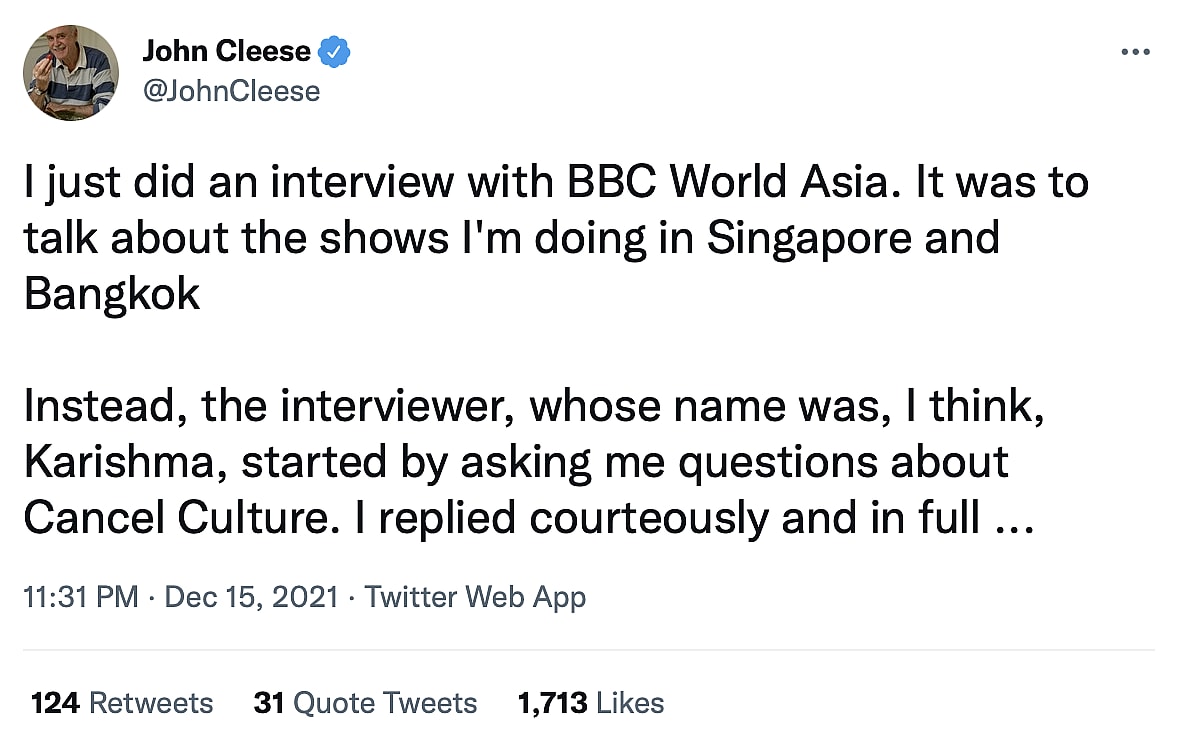
Cleese elaborated, “…I explained that if parents were over protective, it did not prepare children well when they entered the real and often not-very-nice world. She then asked a disjointed question, clearly trying to portray me as old-fashioned, uncaring and basically harmful.”
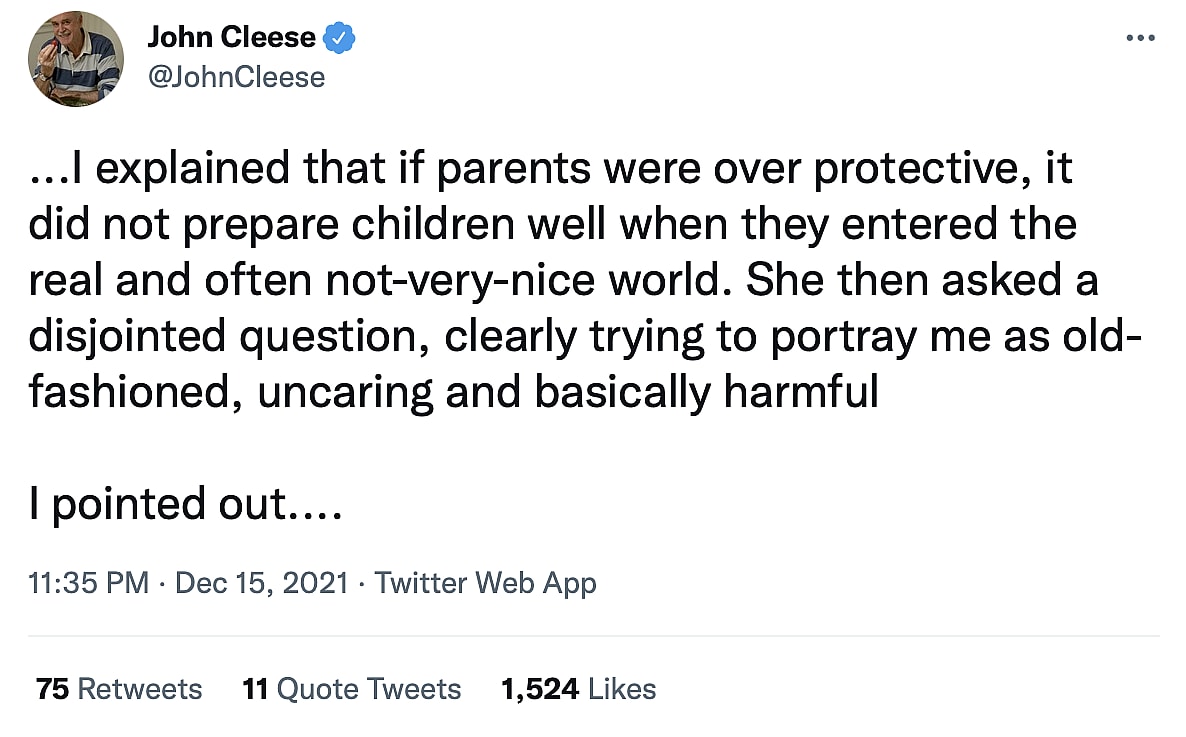
“I pointed out ..that her question was a poor one, since it contained so many very different points l answered one,” the comedian further explained. “Many Cognitive Behavioural Therapists who are successful in helping young people with Anxiety and Depression, feel that Woke principles are almost the opposite of theirs..”
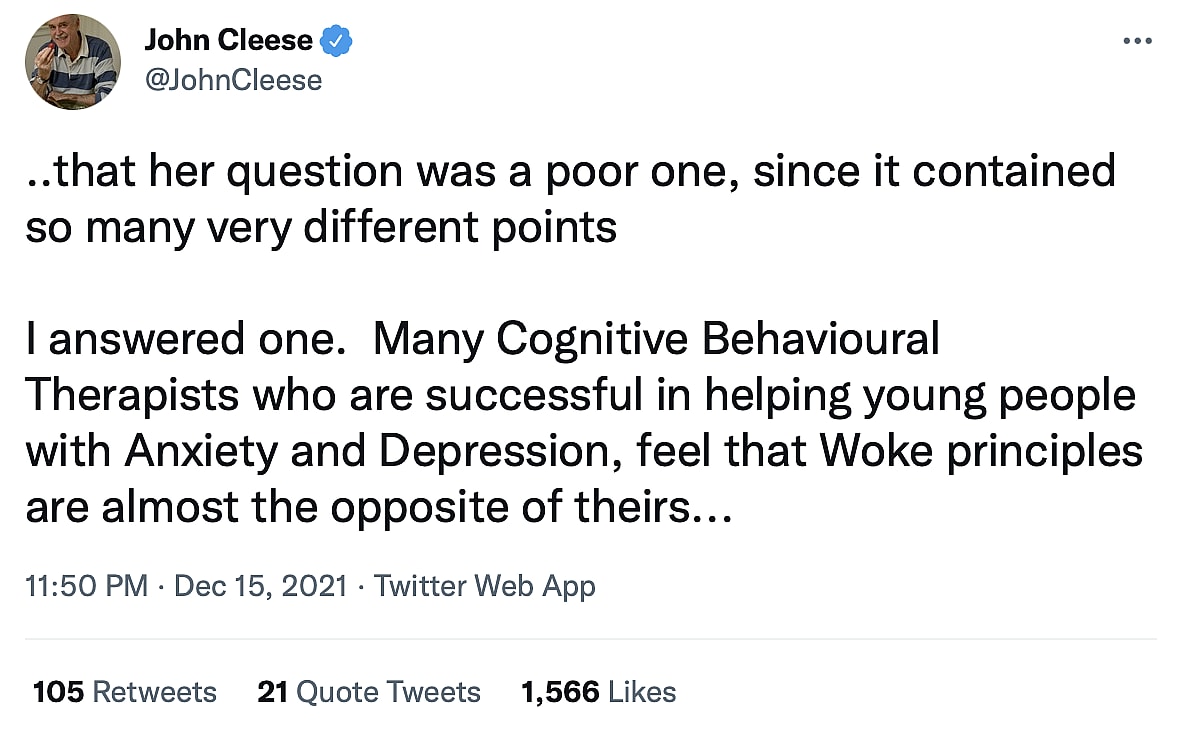
Cleese declared that Vaswani “totally ignored this,” explaining, “At this point pointed out that I had been told than the interview was to be about my shows in Singapore and Bangkok, and I asked if we could now talk about that.”
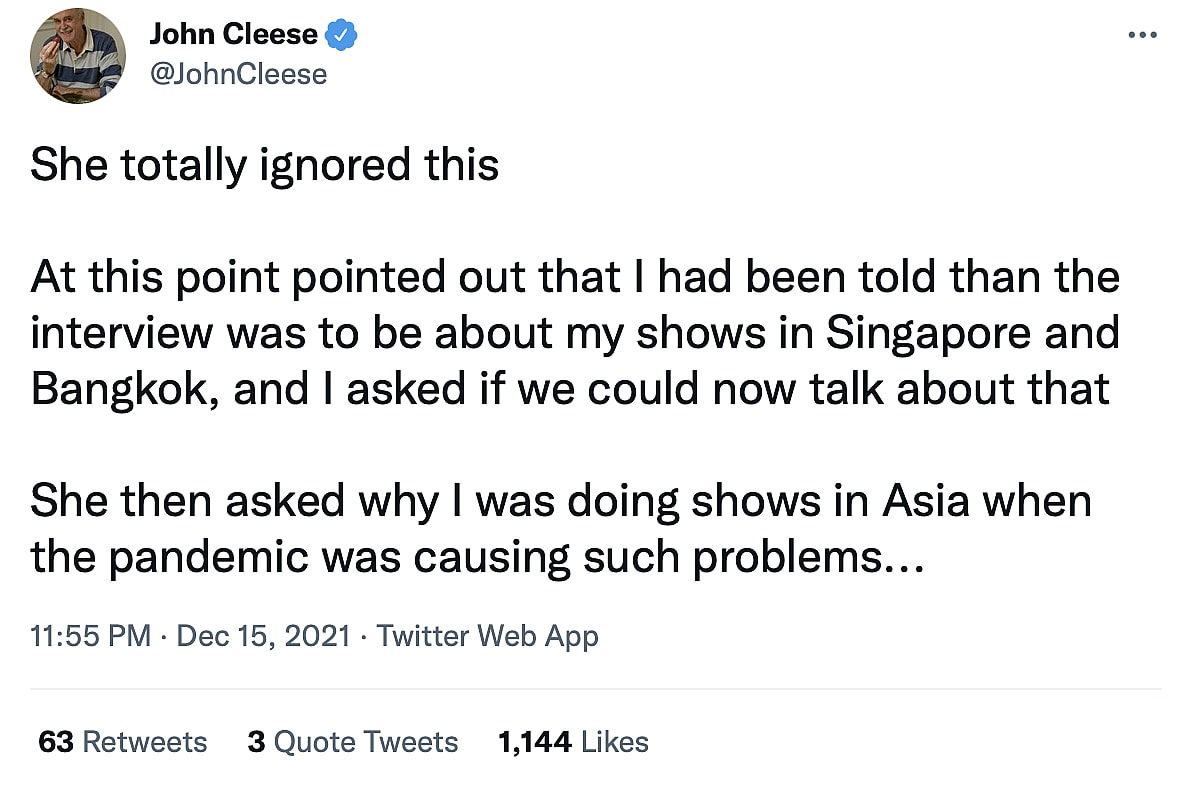
“She then asked why I was doing shows in Asia when the pandemic was causing such problems…apparently blaming me for making he situation worse,” Cleese continued. “I explained that the omicron variant had surfaced only three weeks ago, and that tours are arranged rather more than three weeks ahead.”
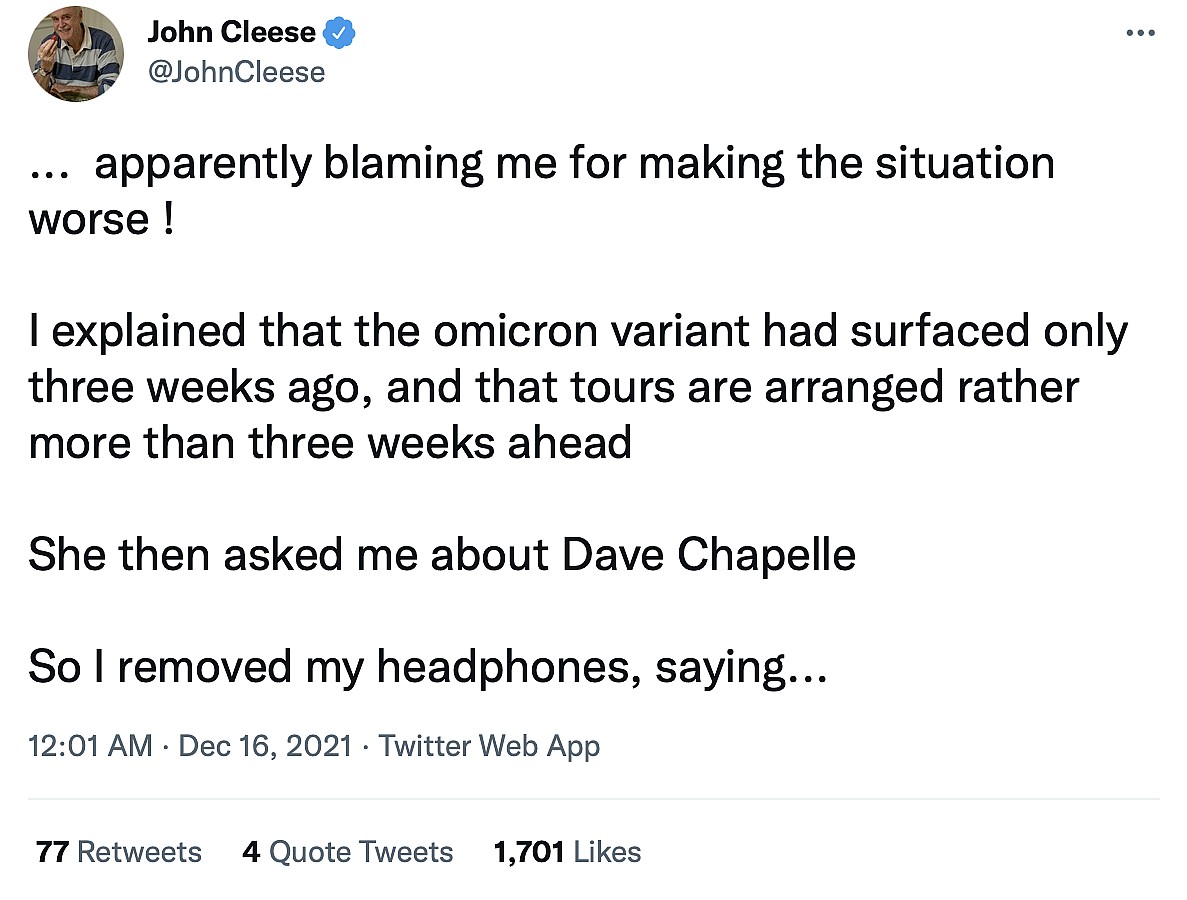
“She then asked me about Dave Chappelle,” the comedian added. “So I removed my headphones, saying that this was not the interview I had agreed to. So I am formally complaining to the BBC about the deception, dishonesty and tone of this interview.”
“Karishma had no interest in a discussion with me,” Cleese concluded, adding that “She wanted only the role of prosecutor,” and suggesting that “The BBC needs to train her again.”
Unlike in the US, the filing of a complaint in the UK is a more formal and bureaucratic process which – particularly when applied to complaints filed against government services such as the BBC – legally requires the infringing institution to formally respond to the complaintant and either “acknowledge where things could have been done better, and tell you what will be done to avoid the same thing happening again” or explain why they will not “uphold your complain”.
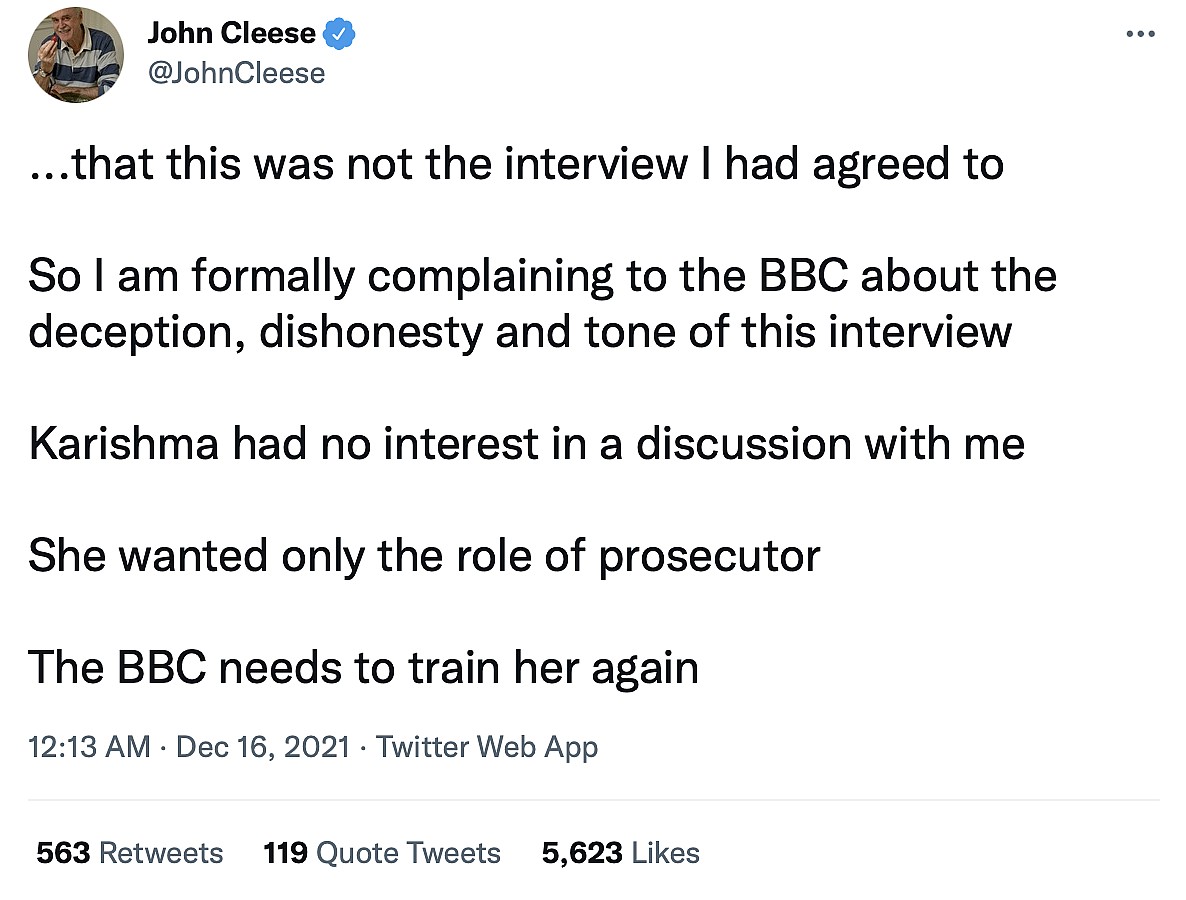
Addressing mainstream media’s potential coverage of the incident, Cleese wrote, “The media will no doubt report that I ‘stormed out.’ I didn’t. Nor did I lose my temper. But I was depressed that this kind of presenter-ego crap is so prevalent now.”
However, the BBC has since responded to Cleese’s accusations, stating that the interview was “fair and appropriate,” and declaring that “our presenter is an excellent and experienced journalist who conducted the interview entirely within our editorial guidelines.”
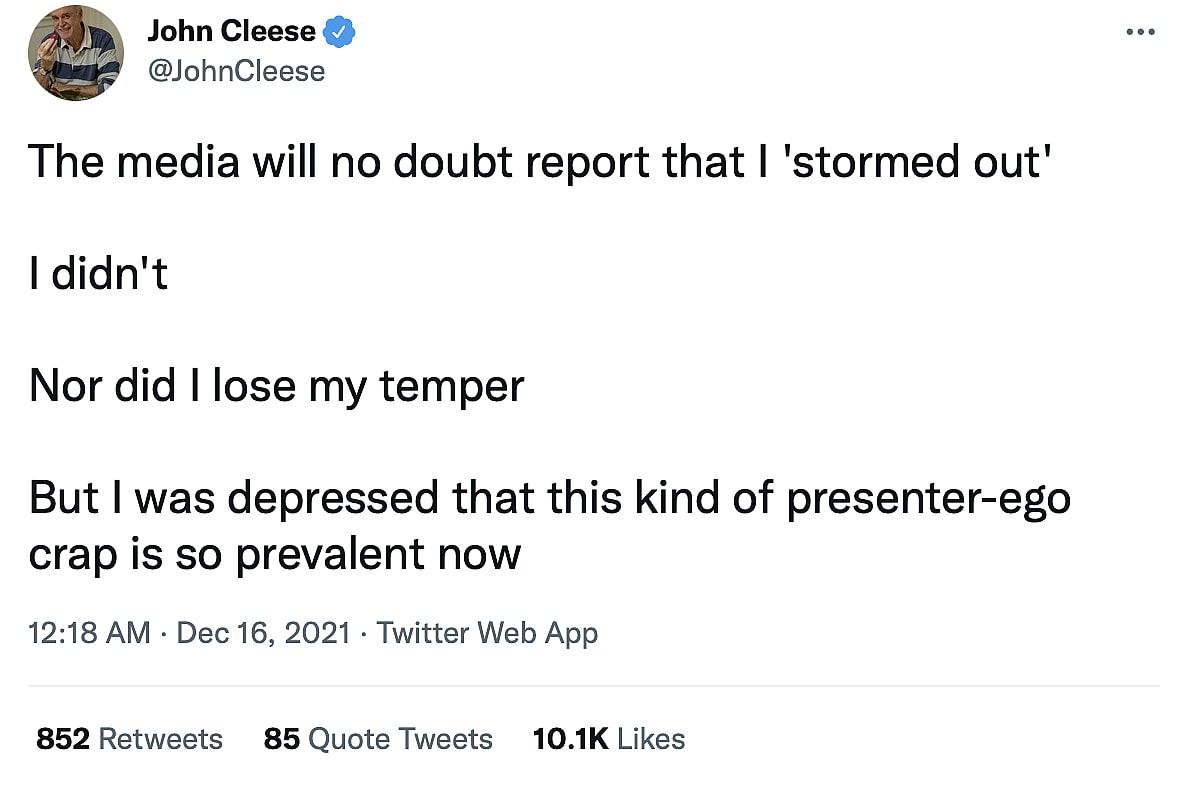
This wouldn’t even be Cleese’s first run-in with the BBC. In 2020, the legendary comedian took issue with the broadcaster when they took down and episode of Fawlty Towers, a series co-created by Cleese, because it contained “racial slurs.”
“I would have hoped that someone at the BBC would understand that there are two ways of making fun of human behaviour,” wrote the Fawlty Towers star at the time, adding, “One is to attack it directly. The other is to have someone who is patently a figure of fun, speak up on behalf of that behaviour.”
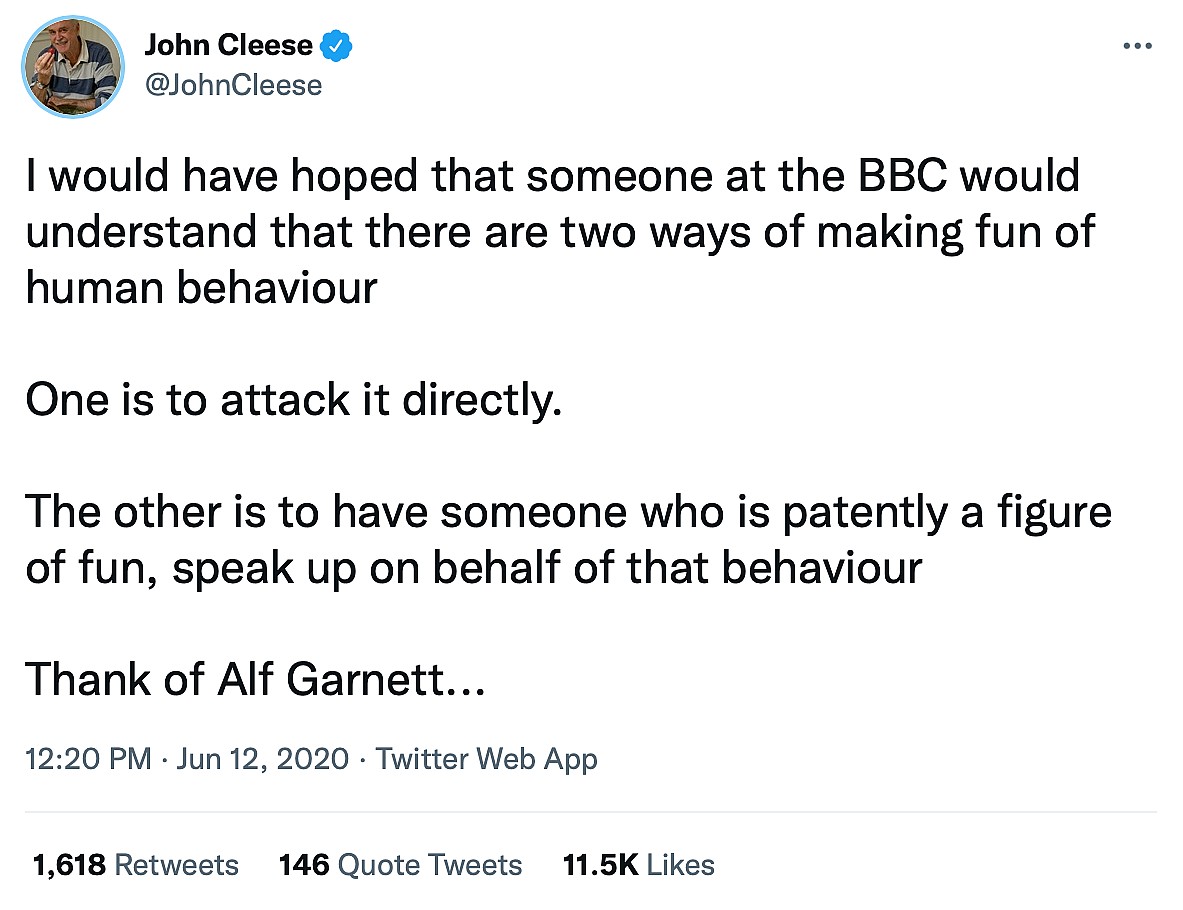
What do you make of Cleese making a formal complaint about his interview with BBC World News? Let us know your thoughts in the comments section down below or on social media.
Next: John Cleese Mocks Hank Azaria’s Apu Apology
